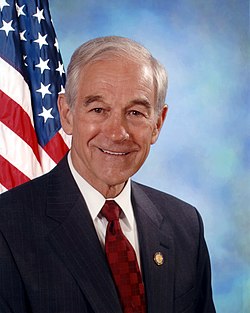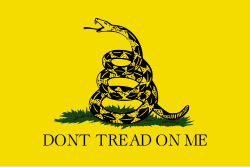Beliefs and size
The Republican Party has historically been divided into factions. In 2012, the libertarian branch of the party was described as smaller than other branches, including Tea Party voters (the "populist, Pro-limited government Tea Party wing" of the party), pragmatic "Main Street" Republicans, and evangelical Christian conservatives. [1] According to a 2012 New York Times analysis, libertarian Republicans have a variety of motivating issues. On economic and domestic policy, they favor deregulation and tax cuts, repeal of the Affordable Care Act, and protecting gun rights. [1] On social issues, they favor privacy and oppose the USA Patriot Act and oppose the war on drugs. [1] On foreign and defense policy, libertarian Republicans are non-interventionists. [1] Some libertarians favor abortion rights, while other libertarian Republicans oppose abortion. [1] Two-thirds of libertarian Republicans are males. [1]
In a 2014 Pew Research Center survey on political typology and polarization, 12% of Republicans described themselves as libertarian. [2] In a 2023 New York Times poll of the Republican coalition, 14% of Republicans were considered Libertarian conservatives. As of August 2023, 38% support providing additional support to Ukraine, 34% support cutting corporate taxes over raising tariffs, 19% consider themselves very conservative, 45% believe abortion should be mostly or always legal, 51% are against comprehensive immigration reform, 73% say they favor the "protection of individual freedom over traditional values", and 13% want a candidate who would "fight corporations that promote woke left ideology." In the 2024 Republican Party presidential primaries, 43% would vote for Donald Trump and 12% would vote for Ron DeSantis. [3]
Organizations
The Republican Liberty Caucus, which describes itself as "the oldest continuously operating organization in the Liberty Republican movement with state charters nationwide," was founded in 1991. [4] In the 1990s the group's chairs included Chuck Muth, Roger MacBride, and Congressman Ron Paul; in the 2000s, the group's chairs included Dave Nalle. [4] The group's statement of principles affirms "the principle that individual rights and liberties are unlimited" and calls for free trade; the "privatization of all government assets"; the abolition of many federal agencies; the repeal of most current federal taxes in favor of a single flat income tax or national sales tax; and the phase-out of "compulsory government retirement, disability, and health programs." [5]
The House Liberty Caucus is a congressional caucus formed by Libertarian Representative Justin Amash of Michigan, at the time a Republican. In 2014, the group "consisted of about 30 libertarian-inclined Republicans (and occasional Democratic visitors like Jared Polis)." [6] In February 2019, Politico reported that the House Liberty Caucus had eight members. [7] The list of congressional member organizations (CMOs) for the 118th Congress indicates that Warren Davidson is the leader of the Congressional Liberty Caucus. [8]
This page is based on this
Wikipedia article Text is available under the
CC BY-SA 4.0 license; additional terms may apply.
Images, videos and audio are available under their respective licenses.






